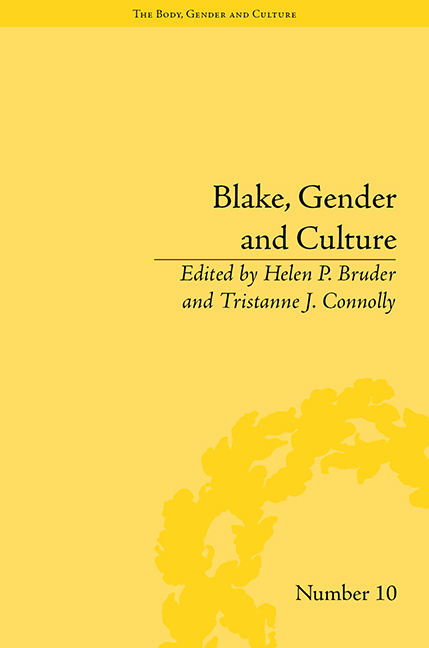Book contents
- Frontmatter
- CONTENTS
- Acknowledgements
- List of Contributors
- List of Figures
- Abbreviations
- Introduction: Naked History Displayed
- 1 ‘Merely a Superior Being’: Blake and the Creations of Eve
- 2 The Last Strumpet: Harlotry and Hermaphroditism in Blake's Rahab
- 3 Sex, Violence and the History of this World: Blake's Illustrations to the Book of Enoch
- 4 Bridal Mysticism and ‘Sifting Time’: The Lost Moravian History of Blake's Family
- 5 ‘A Secret Common to Our Blood’: The Visionary Erotic Heritage of Blake, Thomas Butts and Mary Butts
- 6 Changing the Sexual Garments: The Regeneration of Sexuality in Jerusalem
- 7 Philoprogenitive Blake
- 8 ‘Seeking Flowers to Comfort Her’: Queer Botany in Blake's Visions, Darwin's Loves and Wollstonecraft's Rights of Woman
- 9 ‘Or Wilt Thou Go Ask the Mole?’: (Con)Figuring the Feminine in Blake's Thel
- 10 Gendering the Margins of Gray: Blake, Classical Visual Culture and the Alternative Bodies of Ann Flaxman's Book
- 11 The Virgil Woodcuts Out of Scale: Blake's Gigantic, Masculine Pastoral
- 12 Closet Drama: Gender and Performance in Blake and Joanna Baillie
- Notes
- Works Cited
- Index
3 - Sex, Violence and the History of this World: Blake's Illustrations to the Book of Enoch
- Frontmatter
- CONTENTS
- Acknowledgements
- List of Contributors
- List of Figures
- Abbreviations
- Introduction: Naked History Displayed
- 1 ‘Merely a Superior Being’: Blake and the Creations of Eve
- 2 The Last Strumpet: Harlotry and Hermaphroditism in Blake's Rahab
- 3 Sex, Violence and the History of this World: Blake's Illustrations to the Book of Enoch
- 4 Bridal Mysticism and ‘Sifting Time’: The Lost Moravian History of Blake's Family
- 5 ‘A Secret Common to Our Blood’: The Visionary Erotic Heritage of Blake, Thomas Butts and Mary Butts
- 6 Changing the Sexual Garments: The Regeneration of Sexuality in Jerusalem
- 7 Philoprogenitive Blake
- 8 ‘Seeking Flowers to Comfort Her’: Queer Botany in Blake's Visions, Darwin's Loves and Wollstonecraft's Rights of Woman
- 9 ‘Or Wilt Thou Go Ask the Mole?’: (Con)Figuring the Feminine in Blake's Thel
- 10 Gendering the Margins of Gray: Blake, Classical Visual Culture and the Alternative Bodies of Ann Flaxman's Book
- 11 The Virgil Woodcuts Out of Scale: Blake's Gigantic, Masculine Pastoral
- 12 Closet Drama: Gender and Performance in Blake and Joanna Baillie
- Notes
- Works Cited
- Index
Summary
For we wrestle not against flesh and blood, but against principalities, against powers, against the rulers of the darkness of this world, against spiritual wickedness in high places.
– Ephesians 6:12Tiriel (1789) is Blake's earliest attempt to revise conventional accounts of the origins of this world. Here the serpent of desire rather than Adam and Eve is expelled from the Garden of Eden, leaving our first parents in a state of perpetual ignorance, subject to a senile father, king and god. In The Marriage of Heaven and Hell, published twelve months after Tiriel was written, he turns to a still earlier episode. Aligning angels with repressive reason and devils with revolutionary energy, Blake confronts the orthodox Christian account of Satan's fall from heaven with its uncanny double, while suggesting that both are dependent on point of view: ‘It indeed appear'd to Reason as if Desire [Satan] was cast out. but the Devils account is, that the Messiah fell. & formed a heaven of what he stole from the Abyss’ (MHH 5–6, E34–5).
This sets the scene for the next phase of Blake's career, during which myths of origin are employed to explain not just how this world came into being but how it is maintained. Poetry and prophecy accordingly become indivisible from a nascent sociology and depth psychology; and political, philosophical and aesthetic questions are found enmeshed with epistemological concerns.
- Type
- Chapter
- Information
- Blake, Gender and Culture , pp. 37 - 56Publisher: Pickering & ChattoFirst published in: 2014



